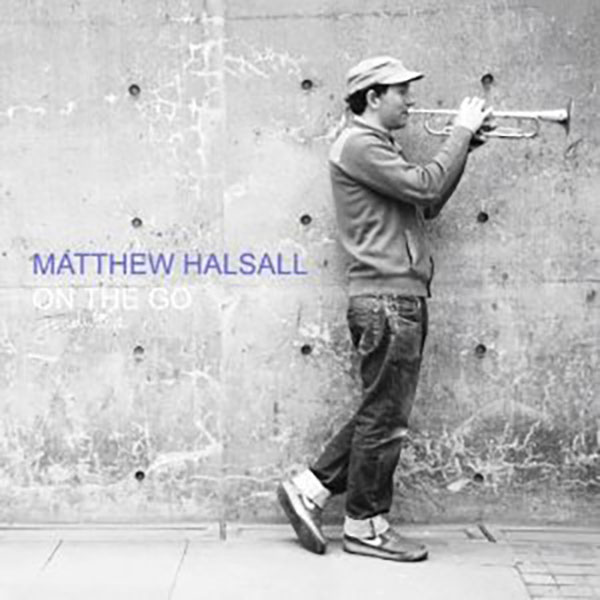
by Ian Mann
May 26, 2011
/ ALBUM
Halsall's updating of the "Kind Of Blue" sound and beyond has won him the approval of jazz fans and critics alike.
Matthew Halsall
“On The Go”
(Gondwana Records GONDCD005)
Manchester based trumpeter and composer Matthew Halsall is a musician with a steadily growing national reputation. “On The Go” is his third release on his own Gondwana label (also home to saxophonist Nat Birchall) and follows the earlier “Sending My Love” (2008) and “Colour Yes” (2009). “Colour Yes” was particularly well received and in its wake Halsall consolidated his position with a number of successful London and festival appearances. I saw him perform an excellent set at the 2010 Brecon Jazz Festival in the company of the band that appears on this album including guest harpist ( that’s the stringed variety, not the gob iron) Rachael Gladwin. I was there as a paying customer so there’s no review on the site but I’m fairly certain that much of the material to be heard on this new album was played on that day.
There’s more to Halsall than just his playing and writing skills, he’s also a record producer, DJ and remix artist and runs his “Matthew Halsall Remixed” project complete with a turntableist, beat boxer and MC in parallel to his regular quintet. There’s also a jazz big band plus strings, The Gondwana Orchestra, which is scheduled to make a special appearance, in addition to the Remix project, at the 2011 Brecon Jazz Festival.
“On The Go” focusses on Halsall’s regular band and is inspired by his love of the modal jazz of Miles Davis and the later “spiritual” music of John Coltrane, Alice Coltrane and Pharoah Sanders. He also draws on the classic sounds of the Blue Note record label but his contemporary sensibilities, as described above, ensure that this music is fresh and vital and far more than just a nostalgia project.
Joining Halsall on the album are the band that I saw at Brecon last summer with Nat Birchall on saxophones, Adam Fairhall at the piano, Gavin Barras on the bass and Gaz Hughes at the drums. On the track “Samatha” the line up is augmented by the sound of Rachael Gladwin’s harp.
The material consists of six lengthy pieces, all composed by Halsall and commences with “Music For A Dancing Mind” a piece which daringly borrows from Dizzy Gillespie’s much loved “A Night In Tunisia”. Halsall reworks the theme in modal fashion, the piece opening with Barras’ bass and quickly establishing a modal vamp that subsequently provides the platform for fine solos from the Coltrane influenced saxophonist Nat Birchall, here on tenor, and from Halsall himself, his trumpet sound deep, rich and rounded. There’s a Milesian eloquence to Halsall’s playing here and throughout the album and a remarkable purity of tone. Adam Fairhall’s piano solo is percussive but imaginative and there’s also something of a feature for drummer Gaz Hughes. The piece may borrow from the past but it also has a real resonance for contemporary audiences, a quality that permeates the album as a whole.
“Song For Charlie” is a dedication to Halsall’s inspirational grandfather and is a beautiful ballad distinguished by the choked intensity of the composer’s trumpeting, pensive and fragile but wonderfully assured and controlled. Fairhall matches these lyrical qualities at the piano and Barras and Hughes provide wholly sympathetic support, the latter’s brushwork is exemplary throughout.
There’s a spiritual dimension to much of Halsall’s work and the next two pieces take their titles from elements of Buddhist philosophy. “The End Of Dukkha” (or suffering) returns to the modal approach and features the sharply probing soprano saxophone of Birchall. Halsall’s trumpet solo is more soft focus, his clarity of sound and purpose recalling Miles Davis in the way that he distils the music to its essence.
“Samatha”, meaning “calm” is the centre piece of the album and exhibits suitably Zen like qualities. There’s a sparseness to the sound with Barras’ low register purr and Hughes’ delicately brushed drums providing just sufficient impetus to the music. Fairhall is again at his most lyrical, Halsall’s lines are long and pure and the ethereal shimmer of Gladwin’s harp adds to the overall mood of serenity.
“The Journey Home” is another soprano showcase for Birchall, his lengthy, sinuous solo unfolding above an urgent modal vamp. Halsall follows him, his softer edged sound making greater use of space. The contrasting styles of the two horn men complement each other well, both here and throughout the album. The mood established here is continued into closing track “The Move” which features Halsall extensively as well as including an engaging solo from drummer Gaz Hughes.
Halsall’s updating of the “Kind Of Blue” sound and beyond has won him the approval of jazz fans and critics alike. His star continues to rise and I’m looking forward to seeing him with his regular band at the Mostly Jazz Festival in Birmingham in July and then with his Remixed and Gondwana Orchestra projects at Brecon in August.